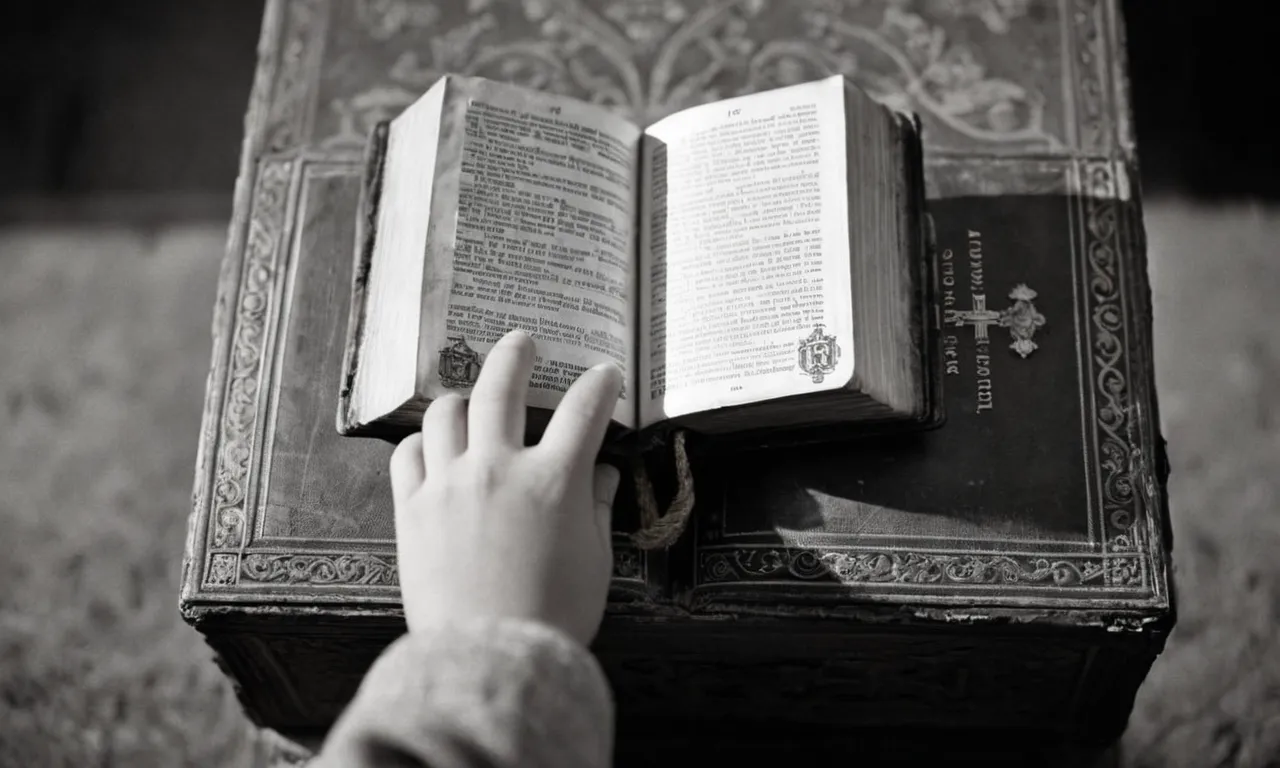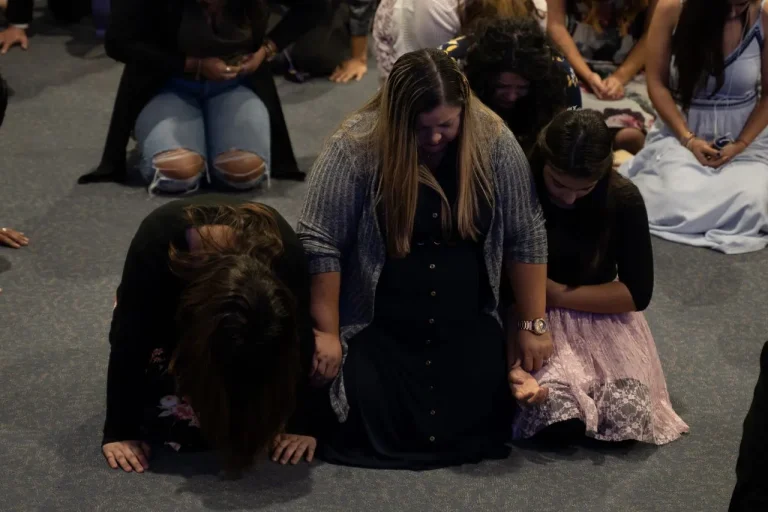What Does The Bible Say About Harming Children?
The Bible contains several passages that forbid violence against children and emphasize protecting and caring for them. This article will examine key scriptures about harming children, provide context around these verses, analyze what they teach, and offer application for readers today.
Exodus 21 – Laws Protecting Servants and Children
Context of Laws in Exodus 21
Exodus 21 contains various laws that God gave to the Israelites after rescuing them from slavery in Egypt. These laws provided guidance on how to treat servants, children, and others in Israelite society.
They emphasized principles of justice, protection of the vulnerable, and proper compensation for injuries.
The section in Exodus 21:20-21 specifically addresses laws about harming servants or children. This passage comes after laws about Hebrew servants and female servants, and before laws about various other injuries.
So the laws about not harming servants and children form part of a larger collection of civil laws for the fledgling Israelite nation.
Verses on Injuring Servants or Children
Exodus 21:20-21 states:
“Anyone who beats their male or female slave with a rod must be punished if the slave dies as a direct result, but they are not to be punished if the slave recovers after a day or two, since the slave is their property.
This law distinguished between injuries that resulted in death versus injuries that the servant recovered from. It allowed for discipline of servants, but not lethal abuse. Servants who died from beatings must be avenged, implying the death penalty for the abuser.
Exodus 21:26-27 further says:
“An owner who hits a male or female slave in the eye and destroys it must let the slave go free to compensate for the eye. And an owner who knocks out the tooth of a male or female slave must let the slave go free to compensate for the tooth.”
This law held masters accountable for permanently injuring their servants. Knocking out a tooth or destroying an eye entitled the servant to be released. This prevented extreme harm to servants.
Principle of Protecting the Vulnerable
While these laws permitted slavery and corporal punishment, they still representedprogress for their time. Limiting violence against slaves was unusual in the ancient Near East. This showed that God cared about the vulnerable in society.
These laws also reflected the principle Jesus taught that “it would be better for them to have a large millstone hung around their neck and to be drowned in the depths of the sea than to cause one of these little ones to stumble” (Matthew 18:6). Hurting children provokes God’s wrath.
Modern societies have continued strengthening legal protections for children. For example, all 50 U.S. states have mandatory reporting laws requiring people to report suspected child abuse or neglect. Societies globally have enacted child labor laws and outlawed practices like child marriage.
Sadly child abuse still exists, but protecting kids remains an ethical priority.
Christ’s Teachings on Children
Receiving and Blessing Children
Jesus often emphasized the importance of receiving and blessing children in His teachings. Here are some examples from the Gospels:
In Matthew 19:13-15, people were bringing their little children to Jesus so He could place His hands on them and pray for them. But the disciples rebuked the parents. When Jesus saw this, He said, “Let the little children come to me, and do not hinder them, for the kingdom of heaven belongs to such as these.”
After He placed His hands on them, He went on from there.
In Mark 10:13-16, people were bringing their little children to Jesus so He could touch them. But the disciples rebuked the parents. When Jesus saw this, He was indignant and said, “Let the little children come to me, and do not hinder them, for the kingdom of God belongs to such as these.
Truly I tell you, anyone who will not receive the kingdom of God like a little child will never enter it.” And He took the children in His arms, placed His hands on them and blessed them.
In Luke 18:15-17, people were bringing their babies to Jesus so He could place His hands on them. When the disciples saw this, they rebuked the parents. But Jesus called the children to Him and said, “Let the little children come to me, and do not hinder them, for the kingdom of God belongs to such as these.
Truly I tell you, anyone who will not receive the kingdom of God like a little child will never enter it.”
These passages demonstrate Jesus’ care and concern for children. He was indignant when His disciples tried to stop parents from bringing their children to Him. Jesus wanted children to come to Him freely, receive His blessing, and experience the kingdom of God. Children held a special place in Jesus’ ministry.
Causing Children to Stumble
While Jesus emphasized blessing children, He had strong words for those who would cause children to stumble in their faith. Here are some examples:
In Matthew 18:1-6, the disciples asked Jesus who is the greatest in the kingdom of heaven. Jesus called a little child to Him and said, “Whoever becomes humble like this little child is the greatest in the kingdom of heaven. Whoever welcomes one such child in my name welcomes me.
But if anyone causes one of these little ones who believe in me to stumble, it would be better for them to have a large millstone hung around their neck and to be drowned in the depths of the sea.”
In Mark 9:36-42, Jesus took a little child in His arms and said, “Whoever welcomes one of these little children in my name welcomes me, and whoever welcomes me does not welcome me but the one who sent me.”
He also said, “If anyone causes one of these little ones who believe in me to stumble, it would be better for them if a large millstone were hung around their neck and they were thrown into the sea.”
In Luke 17:1-2, Jesus said to his disciples, “Things that cause people to stumble are bound to come, but woe to anyone through whom they come. It would be better for them to be thrown into the sea with a millstone tied around their neck than to cause one of these little ones to stumble.”
These words paint a sobering picture. While Jesus loved children dearly, He had grave warnings for any who would lead them into sin or apostasy. Causing children to spiritually stumble provokes Jesus’ utmost wrath. His followers must nurture children in the faith, not become stumbling blocks to them.
Old Testament Examples of Violence Against Children
Jephthah’s Daughter
The story of Jephthah’s daughter is found in Judges 11. Jephthah made a rash vow to sacrifice the first person who came out of his house if God granted him victory over the Ammonites. Tragically, his daughter was the first to come out to meet him with timbrels and dancing when he returned home victoriously.
Jephthah tore his clothes in anguish, but his daughter encouraged him to fulfill his vow. After two months, she returned to her father, and he carried out the sacrifice. This heartbreaking story illustrates how vows and promises were taken very seriously in ancient Israelite society, even when they involved harming one’s own child.
Ammon’s Assault on Tamar
2 Samuel 13 tells the disturbing account of Tamar, daughter of King David. Her half-brother Amnon lusted after her and pretended to be ill in order to get her alone. When she brought bread to him, he overpowered her and raped her. After the assault, Amnon hated her and sent her away.
Tamar mourned her lost virginity in her brother Absalom’s house. When King David heard what happened, he was angry but did nothing. Absalom later killed Amnon in retaliation. This story reveals the low status of women and lack of protection for victims of sexual violence during this time period.
Infant Deaths During Sieges
Several Old Testament passages mention the deaths of infants and children during military sieges of cities. For example, 2 Kings 8:12 and Isaiah 13:16 describe infants being dashed against rocks. The prophets Hosea and Nahum pronounce coming judgment on people who will have their infants killed.
Archaeological evidence confirms that ancient siege warfare practices could be brutal. While these accounts are disturbing to modern readers, they reflect the harsh realities of warfare in antiquity that did not spare even the most vulnerable members of society.
New Testament Warnings Against Harming Children
Millstone Warning
In the New Testament, Jesus Christ issues a stern warning against harming children. In Matthew 18:6, Jesus says, “If anyone causes one of these little ones—those who believe in me—to stumble, it would be better for them to have a large millstone hung around their neck and to be drowned in the depths of the sea.”
This verse illustrates the seriousness of harming or leading children astray. Causing a child to sin is so egregious that drowning would be preferable.
In Mark 9:42, Jesus repeats this warning, stating that those who “cause one of these little ones who believe in me to sin” should have a large millstone hung around their neck and be thrown into the sea. The millstone imagery emphasizes the gravity of harming children spiritually.
As innocent and impressionable members of God’s kingdom, children must be protected and cared for, not exploited or misled.
These passages underscore how seriously Jesus takes offenses against children. Harming or misleading them provokes divine wrath. Throughout the Gospels, Jesus exhibits tenderness and protection toward children.
His stern words are aimed at adults who violate children’s vulnerability and corrupt their faith.
Sexual Immorality and Causing Sin
The New Testament contains several warnings against sexual immorality that could lead children into sin. In Matthew 18:7-9, Jesus declares woe upon “the person through whom the offense comes” and says it would be better to cut off a hand or pluck out an eye rather than let it cause sin.
Similarly, Matthew 5:27-30 condemns lust and advises gouging out an eye if it causes you to sin. These verses caution adults against sexual sin and temptation that could damage children if enacted or taught.
First Corinthians 10:13 promises “No temptation has overtaken you except what is common to mankind.” God provides a way to escape temptation without sin. Adults must take responsibility for resisting sexual immorality and rejecting any behavior that could cause child to stumble.
Applying Biblical Principles On Protecting Children Today
Laws and Social Norms
In recent years, there has been increasing awareness around issues of child abuse and neglect. Laws and social norms have evolved to better protect children. For example, mandatory reporting laws require people like teachers, doctors, and social workers to report suspected cases of abuse.
And there is less social acceptance of harsh physical discipline of children.
As Christians, we can advocate for laws and social norms that align with biblical principles of protecting and nurturing children. We should support funding for child protective services. We can speak out against norms that tolerate “spare the rod, spoil the child” mentalities.
The Bible calls us to gently lead children, not provoke them to anger (Ephesians 6:4).
Preventing Abuse in Churches and Christian Homes
Tragically, child abuse occurs in religious contexts too. Churches must have strong policies to prevent opportunities for abuse. Some best practices include:
- Thorough screening of all staff and volunteers who work with kids
- Mandatory reporting procedures for suspected abuse
- Rules against isolated one-on-one interactions between adults and children
In Christian homes, parents should discipline children in a controlled thoughtful manner, not in anger (Ephesians 6:4). Seek support if feeling overwhelmed or at risk of harming a child.
Seeking Help for At-Risk Children
As Christians, we must care for vulnerable children in our communities. Pay attention to warning signs of abuse or neglect in children you interact with. Learn requirements in your area for reporting suspected cases. Some signs to look for include:
- Poor hygiene, undernourishment, inappropriate clothing
- Unexplained injuries, especially frequent ones
- Extremely withdrawn or anxious demeanor
You can also support organizations that provide services to at-risk children and families. There are opportunities to mentor, foster, adopt, and donate goods or money. James 1:27 says that true religion is to care for widows and orphans in distress.
As followers of Christ, we must be at the forefront of protecting children.
Conclusion
In conclusion, the Bible contains unambiguous prohibitions against violence against children and clear calls to protect and nurture them. Key passages teach core principles around protecting vulnerable children, preventing abuse or causing them to stumble spiritually, and upholding their value and rights in society.








